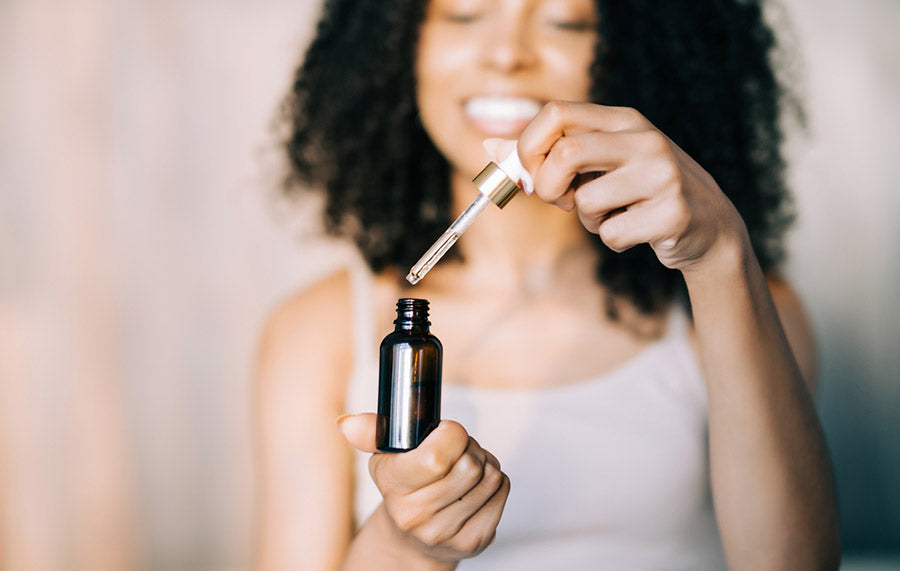Can You Use Glycolic Acid with Retinol? Your Questions Answered

By Alex and Maria photo / Shutterstock.com
Both glycolic acid and retinol are potent skincare multitasking agents that offer lots of benefits in a single package. This begs the question: Are these ingredients too powerful to be used together? In this guide, we’re taking a look at why you might want to include both glycolic acid face peels and retinol in your skincare routine, and whether or not you can use both of these ingredients together.
What Is Glycolic Acid?
Glycolic acid is an alpha hydroxy acid derived from sugar cane. Glycolic acid is a chemical face exfoliator that helps to dissolve the bonds between dead skin cells. Glycolic acid offers many benefits, including more even skin tone and texture, better oil control, reduced acne breakouts and faster skin cell turnover.
Glycolic acid comes in many different forms and concentrations — from daily face washes to monthly face peels to glycolic acid body lotions. Many people like to use glycolic acid in a leave-on treatment that they apply one to three times weekly, depending on how often their skin needs it.
What Is Retinol?
Retinols are a subcategory of retinoids, which are all derived from vitamin A. Retinols are not as potent and are generally available over the counter, while retinoids are stronger and generally only available through a prescription from a dermatologist. Retinoids promote collagen growth, which helps to prevent and reduce the appearance of wrinkles and also to lighten dark spots and control acne.
Retinols are typically sold in a serum form, but you may find the ingredient incorporated into other products, such as body lotions, as well. Retinols can be sensitizing and drying to the skin, so you should start by applying it once per week underneath moisturizer and then work up to increasing the frequency to every other day.

By Y.P.photo / Shutterstock.com
Can You Use Glycolic Acid with Retinol?
Once upon a time, you might have been cautioned against using retinol and glycolic acid together in your 3-step skincare routine. Now, research has shown that alternating glycolic acid and retinol can be more beneficial than using one or the other exclusively. That’s because retinol speeds up skin cell turnover, while glycolic acid takes care of the extra dead skin cells. In fact, if you use retinol without some kind of exfoliator, you might eventually find yourself with a lot of dry, dead skin cells on your face — and nobody wants that.
However, it’s generally not a good idea to use glycolic acid and retinol in the same routine since they are both very strong ingredients and applying them to your face at the same time can lead to irritation. Furthermore, both retinol and glycolic acid should be used at night because they make your skin more sensitive to the sun. This means that it’s best to alternate your glycolic acid with your retinol in your nighttime routine (don’t put one on in the morning and another at night, in other words).

By fizkes / Shutterstock.com
Buy Our Glycolic Acid Body Lotion
Glycolic Acid vs. Retinol: Which to Get Started with?
If you’re not currently using either glycolic acid or retinol, then choose only one to introduce at a time. If you try to use both glycolic acid and retinol without first building your skin’s tolerance, then you might accidentally damage your skin barrier.
You should start with glycolic acid if you are currently struggling with oil control, clogged pores and/or dry patches of dead skin cells. Glycolic acid is also a better starter product for people with sensitive skin because it is less sensitizing than retinol. On the other hand, you should start with retinol if you are currently focused on treating signs of aging, sun damage and/or acne.
Keep in mind that both glycolic acid and retinol are available in many different strengths. If you are just beginning your skincare journey, seek out gentler products with lower concentrations of these powerful ingredients. As your skin gets used to them, you can graduate to higher percentages of these ingredients and/or use them at a higher frequency. Watch out for signs of irritation and don’t be afraid to back off if you notice your skin barrier looking stressed.
At Lancer Skincare, we sell dermatologist-developed products that feature tried-and-true ingredients like glycolic acid and retinol so that you know you are using safe and effective skincare. All of our products ship free and come with a 30-day money back guarantee so that you can buy with confidence!
 PREVIOUS (How Often Should You Exfoliate?)
PREVIOUS (How Often Should You Exfoliate?) NEXT (What Is Glycolic Acid and How Is It Used?...)
NEXT (What Is Glycolic Acid and How Is It Used?...)